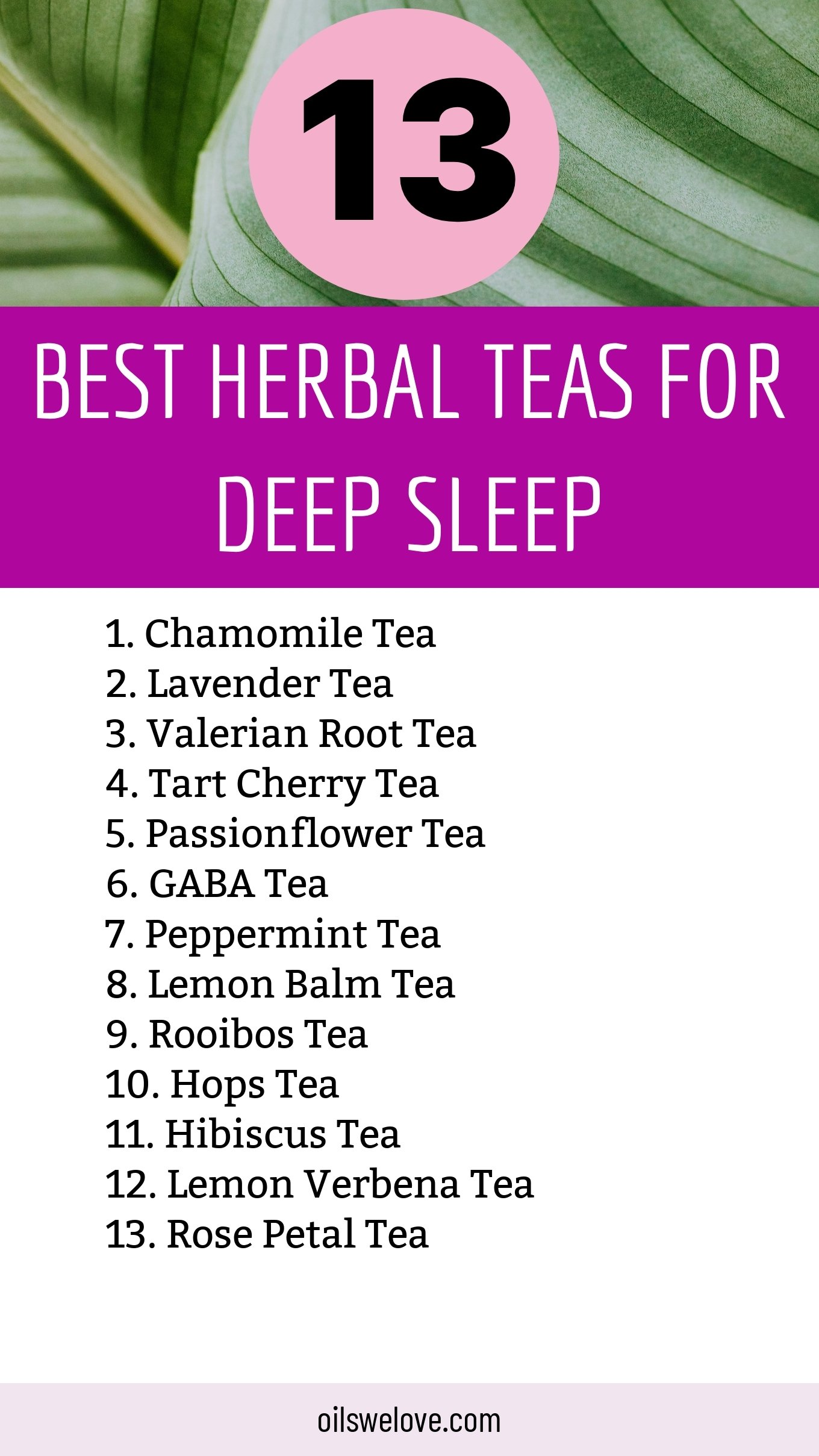13 Best Herbal Teas for Deep Sleep
Are you struggling to get a good night’s sleep? Herbal teas can be a natural and effective way to promote relaxation and help you drift off into a deep slumber. In this article, we will explore 13 of the best herbal teas for deep sleep, each with their unique properties and benefits.
The 13 Best Herbal Teas for Deep Sleep
When it comes to calming the mind and body before bedtime, herbal teas are a popular choice for many people. Here are 13 herbal teas known for their sleep-inducing properties:
- Chamomile Tea: A classic bedtime tea that is known for its calming effects.
- Lavender Tea: This fragrant tea can help reduce anxiety and promote relaxation.
- Peppermint Tea: Peppermint tea can aid digestion and soothe the stomach before bed.
- Valerian Root Tea: Known for its sedative properties, valerian root tea can help improve sleep quality.
- Lemon Balm Tea: Lemon balm tea can help reduce stress and improve sleep.
- Passionflower Tea: This tea can help calm the mind and improve sleep quality.
- Cherry Tea: Cherry tea is rich in antioxidants and can help regulate the sleep cycle.
- Green Tea: Green tea contains L-theanine, an amino acid that can promote relaxation and improve sleep.
- Valerian Root Tea: Known for its sedative properties, valerian root tea can help improve sleep quality.
- Lemon Balm Tea: Lemon balm tea can help reduce stress and improve sleep.
- Passionflower Tea: This tea can help calm the mind and improve sleep quality.
- Cherry Tea: Cherry tea is rich in antioxidants and can help regulate the sleep cycle.
- Green Tea: Green tea contains L-theanine, an amino acid that can promote relaxation and improve sleep.

The Best Herbal Teas for Deep Sleep: A Relaxing Guide to Serenity
Do you ever find yourself tossing and turning, staring at the ceiling, wishing for a few precious hours of uninterrupted rest? Let the soothing embrace of herbal teas guide you to a night of deep, rejuvenating sleep. Below, you’ll discover a handpicked selection of herbal teas known for their sleep-enhancing qualities.
Chamomile Tea: The Classic Calmer

Chamomile tea is perhaps the most well-known herbal tea for promoting relaxation and reducing anxiety. Its delicate, apple-like flavor is only matched by its ability to ease your mind before bedtime. This calming brew works wonders by binding to certain brain receptors, helping you drift into a peaceful slumber. Whether sipped alone or blended with other herbs, chamomile is a staple in any bedtime ritual.
For more information, visit Healthline.
Lavender Tea: The Soothing Sleep Sentinel
Lavender tea is infused with the gentle, floral scent of lavender blossoms, renowned for their calming properties. Often used in aromatherapy, lavender tea can improve overall sleep quality by helping you relax and easing anxiety. This aromatic elixir not only helps you unwind but also adds a touch of tranquility to your evening routine.
Learn more at MindBodyGreen.
Valerian Root Tea: The Natural Sedative
Valerian root tea might have an earthy taste, but its effects are nothing short of magical. Known as a natural sedative, valerian root is perfect for those who struggle with falling asleep. It enhances the body’s GABA levels, promoting relaxation and lengthening sleep duration, making it a perfect companion for a restful night.
Explore further details at Verywell Health.
Tart Cherry Tea: The Melatonin Magic
Tart cherry tea stands out with its unique, tangy flavor and powerful sleep benefits. Rich in melatonin, a hormone that regulates sleep-wake cycles, it aids in synchronizing your body’s internal clock. Incorporating tart cherry tea into your evening routine can help improve sleep duration and quality, making it a delightful choice for those looking to enhance their sleep naturally.
Dive deeper on the Sleep Foundation.
Passionflower Tea: The Tranquilizer
Passionflower tea brings an exotic flair to your nighttime routine. Traditionally used to combat insomnia and anxiety, it acts as a gentle tranquilizer that calms the nervous system. By increasing GABA levels in your brain, it paves the way for a restful night’s sleep, allowing you to wake up refreshed and rejuvenated.
Check out more at WebMD.
GABA Tea: The Brain-Calming Brew
GABA tea is not your typical herbal infusion. This powerful tea mimics the effects of prescription sleep aids by calming neural activity in the brain. By promoting deep relaxation, it assists in securing a restorative night’s sleep. Ideal for those with high-stress lifestyles, GABA tea could be the gentle push you need to achieve tranquility.
Learn more from Healthline.
Peppermint Tea: The Digestive Soother
Peppermint tea might not directly induce sleep, but its calming effect on digestive issues can indirectly enhance sleep quality. Relieving discomfort from bloating or indigestion allows your body to focus on rest, not distress. Plus, its invigorating minty aroma adds a refreshing twist to your wind-down routine.
Find more on Livestrong.
Lemon Balm Tea: The Stress Reliever
Lemon balm tea is celebrated for its stress-relieving powers. Its subtle citrus flavor soothes the senses, easing anxiety and promoting relaxation. Incorporating lemon balm into your evening ritual can help create a serene environment, setting the stage for a tranquil sleep experience.
More details available at Dr. Axe.
Rooibos Tea: The Antioxidant Ally
Rooibos tea, a caffeine-free herbal delight from South Africa, is packed with antioxidants that help regulate body temperature during sleep. This contributes to better rest quality, making it a marvelous choice for those seeking a restorative slumber without the jitters of caffeine.
Discover more on Wellness Mama.
Hops Tea: The Traditional Insomnia Remedy
Hops tea has roots in traditional medicine, often used as a remedy for insomnia due to its naturally sedative properties. The calming effects on the nervous system make hops tea a powerful ally against sleepless nights, helping you drift into dreamland with ease.
Read more at Medical News Today.
Hibiscus Tea: The Heart Helper
Hibiscus tea is not only a vibrant and refreshing beverage but also a treasure trove of vitamins and minerals. It helps regulate blood pressure and promotes cardiovascular health, which can indirectly improve sleep quality by minimizing disruptions during the night.
Further information available at Healthline.
Lemon Verbena Tea: The Lavender’s Twin
Lemon verbena tea shares calming properties similar to lavender, making it an excellent choice for relaxation before bedtime. Its light, citrusy flavor can ease stress and anxiety, paving the way for a peaceful night’s sleep.
Learn more on MindBodyGreen.
Rose Petal Tea: The Floral Fantasy
Rose petal tea offers more than just a delightful floral scent. This aromatic infusion creates a calming environment, perfect for unwinding before bed. The routine of sipping rose petal tea can become a cherished part of your nighttime ritual, guiding you gently into a serene sleep.
Explore more at Organic Facts.
Embracing the world of herbal teas can transform your bedtime routine into a ritual of relaxation and tranquility. From the classic chamomile to the exotic passionflower, each tea offers unique benefits that pave the way for restful slumber. Whether you’re dealing with anxiety, digestive issues, or simply seeking a natural aid for better sleep, there’s a tea for you. So, steep, sip, and sink into serenity tonight.




